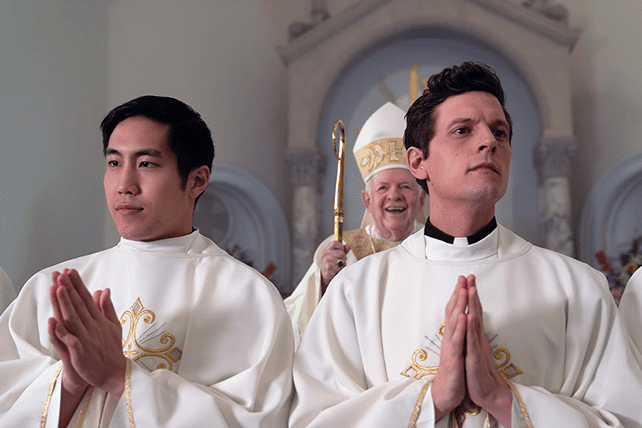(RNS) — On a spring day in the mid-aughts, the Rev. Stephen Fichter was grabbing a slice of pizza from a shop in Ho-Ho-Kus, New Jersey, when a boy from Fichter’s church pointed to him and said, “I didn’t know he could eat pizza!”
Almost two decades later, Fichter, pastor of St. Elizabeth of Hungary Church in Wyckoff, New Jersey, wants people to know that not only do priests enjoy gastronomic delights, they’re also fully human.
“There’s a sense of priests being a separate entity,” said Fichter, who told Religion News Service that viewing priests purely as spiritual figureheads can, as the Catholic abuse crisis indicates, have dire consequences. And while reductive narratives in film and media depict priests as perfect heroes or evil villains, he said, truth is more complicated.
“I wanted to write a film that would strike a balance,” said Fichter, who began developing the idea for the movie “Trinity’s Triumph” in 1998.
Starring Emmy winner Joe Morton (“Scandal”) and Emmy-nominated actor Young Mazino (“Beef”), “Trinity’s Triumph” is now available to stream on Amazon Prime and other platforms. The first feature-length film written by a priest, according to Fichter, it follows three Catholic seminarians who tell corny jokes, sin occasionally and grapple with the demands of the priesthood.
“How many people really want to have vows of celibacy, poverty and obedience?” Thomas G. Plante, a professor of psychology at Santa Clara University, emeritus professor at Stanford University and co-editor of “Sexual Abuse in the Catholic Church: A Decade of Crisis,” said about the challenges faced by today’s Catholic seminarians. “Our culture so much values sexual freedom, doing whatever you want, whenever you want, and we worship money and riches. It’s so completely countercultural to go into this kind of life.”
According to Colleen McDannell, a religious studies professor at the University of Utah and editor of the book “Catholics in the Movies,” the holier-than-thou priests in early films such as “Going My Way” and “The Bells of St. Mary’s” are the product of Hollywood’s Motion Picture Production Code, a set of industry guidelines authored by Catholics in the 1930s that functioned as a form of self-censorship to avoid government interference.
“Up until the 1960s, you couldn’t say anything negative about religion. You could not make the priest a hypocrite. And so in all the early films, any religious person, the minister or priest, they were good people,” said McDannell. The abandonment of the code in 1968 paved the way for more corrupt priestly characters, she added, like those in the 1981 thriller “True Confessions.”
As Fichter set about writing a more nuanced screenplay, he sought input from Italian filmmaker Franco Zeffirelli (known for the miniseries “Jesus of Nazareth” and the 1968 version of “Romeo and Juliet”) and suspense novelist Mary Higgins Clark, who was also one of Fichter’s parishioners. By 2019, his team included co-writer and co-producer Kathe Carson and filmmaker Michael Wickham.
“I liked that it didn’t shy away from some of the harder topics, when it comes to what it takes to be a priest,” Wickham said about his decision to direct the film.
Like Fichter, Wickham grew up in New Jersey. He was heavily involved in his Catholic parish, acting as an altar server before eventually attending Siena College, a Franciscan school near Albany, New York. There, he told RNS, he befriended friars who’d stay up after 10 p.m. Masses to debate philosophy and movies.
“I was happy to have the opportunity to represent a side of the church that I experienced,” he said.

